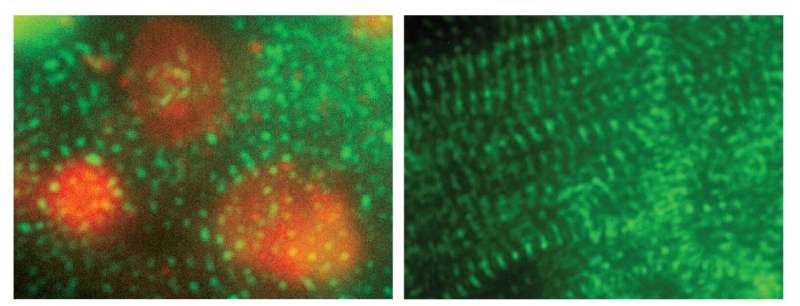This article has been reviewed according to Science X's editorial process and policies. Editors have highlighted the following attributes while ensuring the content's credibility:
fact-checked
peer-reviewed publication
proofread
Using SPEDOX-6 to provide targeted cancer treatment and protect heart cells

Chemotherapy is one of the main therapeutic modalities for cancer patients. Chemotherapeutic drugs destroy cancer cells in the body, but patients frequently face side effects since the drugs do not selectively target cancer cells and may also be toxic to healthy cells to varying extents.
One example is the chemotherapeutic drug called doxorubicin (dox), which is frequently given to cancer patients with breast cancer and certain types of blood cancers. However, up to one third of patients receiving high-dose doxorubicin treatment experience heart damage, which in the long term can lead to heart failure. Like cancer cells, dox can enter normal heart cells where it damages the cell's DNA and ultimately causes cell death.
To increase dox's specificity for cancer cells, researchers Arun Sharma, Xiaojiang Cui, and colleagues at Cedars-Sinai Medical Center and scientists at Sunstate Biosciences Inc, U.S., came up with a way of enveloping dox with a protein shell. The findings are published in the journal Stem Cell Reports.
The new formulation called SPEDOX-6 increased the drug's likelihood of being taken up by fast-dividing cells such as cancer cells while also reducing its toxicity to heart cells. Lab-based tests with human cancer cells and human stem cell-derived heart cells confirmed that SPEDOX-6, like dox, was highly toxic to cancer cells but much less toxic to normal human heart cells than conventional dox.
The same effect was seen with heart cells made from patients with increased risk for dox-induced heart damage due to genetic mutations. This data confirms that SPEDOX-6 is less toxic to heart cells while preserving its anticancer activity.
A clinical trial is currently being planned to test the safety and efficacy of SPEDOX-6 in cancer patients.
More information: Arun Sharma, Protein-Encapsulated Doxorubicin Reduces Cardiotoxicity in hiPSC-Cardiomyocytes and Cardiac Spheroids While Maintaining Anticancer Efficacy, Stem Cell Reports (2023). DOI: 10.1016/j.stemcr.2023.08.005. www.cell.com/stem-cell-reports … 2213-6711(23)00303-X




















